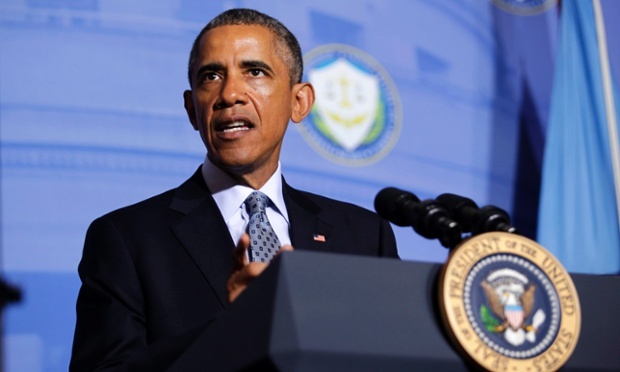President Obama’s recently announced comprehensive new cybersecurity proposal for the U.S., highlighted in his State of the Union address (you can see a full transcript of this address here), puts the issue of cybersecurity where it should be: front and center.
The high-profile cyber-attacks and hacks of the past year have drawn a mainstream spotlight to cybersecurity. As the President emphasized in his address: “No foreign nation, no hacker, should be able to shut down our networks, steal our trade secrets, or invade the privacy of American families, especially our kids.”
What are my thoughts? I think this is a real, actionable step in the right direction to increase the war on cyber-attacks and protect consumers and businesses.
The new Presidential cybersecurity proposal, officially announced on December 19 at the National Cybersecurity and Communications Integration Center, aims to move to quicker and more active security breach and threat reporting.

Image courtesy of The Guardian
According to the White House announcement, the proposal would create a more proactive environment for companies and organizations in the private sector to share security breaches with the government. The proposal, for example, would criminalize the sale of stolen financial data, and mandate that companies notify consumers about data breaches, as well as protect companies from liability.
As stated by the White House, “Specifically, the proposal encourages the private sector to share appropriate cyber threat information with the Department of Homeland Security’s National Cybersecurity and Communications Integration Center (NCCIC), which will then share it in as close to real-time as practicable with relevant federal agencies and with private sector-developed and operated Information.”
Information sharing provides a way to get a real-time response to these breaches. But it’s the old left-hand, right-hand problem. Information sharing would speed up an organized response to a data breach or cyber-threat and allow a concerted response. But there remain legitimate concerns in many camps about the information shared.
This proposal seems to be well crafted in that it recognizes a general apprehension of handing over information to the government, a genuine concern (even an obsession) for many. The plan seeks to mollify privacy concerns by requiring participating companies to comply with a set of restrictions, such as removing “unnecessary personal information” and to protect personal information that has been shared.
A national standard in the United States for reporting breaches has been a long time coming. If you’re a company that has been hacked, your obligations are different in different states. If your information has been hacked, a company’s obligation to report it to you currently depends on the regulations of the state you reside in, which simply doesn’t make sense. If you’ve been hacked by someone from Russia, for example, does it matter whether you live in Connecticut or Texas? The problem is a global one, but a national plan is a great move.
The new cybersecurity proposal has critics and supporters lining up in debate. And the prospect is real that this cybersecurity plan like previous proposals could become stalled in Congress.
“cybersecurity needs to be proactive in preventing and detecting cyber crime”.
We all need to focus on the idea that cybersecurity is not just reactive, but needs to be proactive – in preventing and detecting cyber crime. The President’s proposal is a step along that path.
I’m looking forward to a next step and results of the newly announced Summit on Cybersecurity and Consumer Protection at Stanford on February 13, 2015 which will convene a wide variety of groups for industry, private and public – to help shape public and private sector efforts to protect consumers and companies from growing network threats.
The good news is that momentum for cybersecurity is building. If we can get business, government, and the security industry in this country working from the same digital page, the benefits could be tremendous.
It’s a critical and very exciting time to be in digital security.